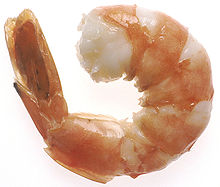
Shrimp Is High in Cholesterol, But Is It Healthy?
This article is dedicated to my friend whom I was talking to today about her doctor’s visit. Her new doctor wants her to go on a 1500 to 1600 calorie, low-carb diet. Wow, I’m impressed that her doctor realizes that carbs cause major health problems!
I was discussing cholesterol with her. So is it bad? If you listen to conventional wisdom, you would think so; however, the truth is that cholesterol is not the problem. Insulin (which is released into the blood during carbohydrate metabolism) is the problem. It is responsible for synthesizing cholesterol.
What Is Cholesterol?
Cholesterol is actually not a fat. It is a waxy substance found in cell membranes and transported in the blood plasma of all animals. It’s essential to the structure of the cell membranes. Without it, the cell membrane would allow all types of unwanted substances to enter the cell. Additionally, cholesterol is an important component in the creation of fat-soluble vitamins, including Vitamin A, Vitamin D, Vitamin E, and Vitamin K, as well as steroid hormones and bile acids. (See the Wikipedia article “Cholesterol.”)
Why Do People Have High Cholesterol?
The total cholesterol level in the blood is actually a composite of the values for triglycerides, high-density lipids (HDL or “good” cholesterol), and normally a calculated value of low-density lipids (LDL or “bad” cholesterol). Any of the four values can pose a problem: total cholesterol too high, triglycerides too high, HDL too low, and LDL too high. (Actually, cholesterol can be too low, too, but few people realize that. More later.)
Insulin, as mentioned above, controls the synthesis of cholesterol out of fat, as just one of the many roles it plays as a master hormone in your body. (It also tells your body to store the food you eat as fat.) The typical American diet is high in carbs and fat, which can be a deadly combination. Insulin will tell the body to convert the fat into cholesterol. The more carbs and fat you eat, the higher your total cholesterol, LDL, and triglycerides and the lower your HDL number. High triglycerides and high LDL could mean undiagnosed diabetes.
It is possible to have a low LDL and a high triglycerides level. This suggests insulin resistance and an increased risk of heart disease, as does a triglyceride to HDL ratio greater than 4 to 1, according to the article “It’s insulin—not cholesterol you should watch like a hawk” on the MedHelp.com website (which has long-standing partnerships with the top medical institutions such as the Cleveland Clinic, National Jewish, Partners Health, and Mount Sinai). Anything under 2 to 1 means a low risk of heart disease. The higher the ratio, the higher the risk of heart disease.
To lower your cholesterol, cut down on the carbs and increase your protein. When you eat carbs, choose lots of low-starch vegetables and some fruits, which are also low-starch.
Does This Mean Low-Fat Diets Are Safe?
Absolutely not! Low-fat diets can increase the risk of certain types of strokes and cancer. Remember the cell membranes membranes mentioned above? The theory is that cancer cells, viruses, and other foreign bodies can more easily enter cells when they are structurally compromised by not having enough fat to synthesize into cholesterol. In fact, total cholesterol levels lower than 150mg/dL increase the risk of these diseases. (Please see a long-term Japanese study of 20 years “Japanese stroke clues: are there risks to low cholesterol?”.)
Certainly, reducing fat when eating a high-carb diet can lower cholesterol, but that’s only treating a symptom of a much larger problem: too much insulin. We did not evolve eating low-fat or high-carb diets.
A High-Protein, High-Fat, Low-Carb Diet
The body does not need any carbs to survive, but it does need protein and fat. Inuit (Eskimos) eating a traditional diet only eat a certain type of plant when they can’t find any meat. (This is not just a cultural phenomenon.) In fact, they believe plants are unfit for human consumption. Humans evolved eating a high-protein, high-fat, low-carb diet, and most hunter-gatherer groups still eat this way. (See “The paradoxical nature of hunter-gatherer diets: meat-based, yet non-atherogenic.” Note that hunter-gatherers are very healthy until they start eating a Western diet high in carbohydrates; then, they start having high rates of Western diseases, such as obesity, diabetes, high blood pressure, high cholesterol, autoimmune diseases, etc.) In fact, hunter-gatherers eat the entire animal, not just the muscle like we do, which gives them a greater amount of fat to eat, such as from the bone marrow and brains. Unlike the hunter-gatherers, we have greatly deviated from our biological needs (by eating high amounts of carbohydrates), so we’ve created an epidemic of diseases in the body.
With a low-carb diet, the insulin levels are kept to a minimum, so there is less fat storage, and less synthesis of cholesterol. Insulin controls so many more functions in the body that are outside of this article, but I will mention that low insulin levels have many other health benefits. For example, excessive insulin levels have been linked to Alzheimer’s Disease.
What about Dietary Cholesterol?
I’ve reviewed various studies of people eating high-cholesterol foods (i.e., naturally occurring cholesterol), such as shrimp. There was absolutely no evidence of increased cholesterol. So don’t worry about tracking cholesterol if it is naturally occurring in foods. Enjoy that shrimp!
The Bottom Line
Maintaining your cholesterol and health means effectively managing the master hormone insulin by eating a lower carb diet. Next time, consider holding that hamburger bun and fries. Your body will thank you for giving it the proper proportion of nutrients it evolved on.